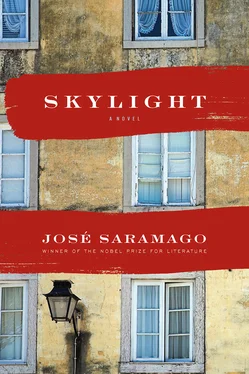Lídia, however, had reacted in a completely unforeseen way. He had explained the dilemma to her as coolly as possible: to stay or to leave, reserving for himself the right to proceed as he saw fit should he decide on the former option. But why had she not answered his question? Why would she not just say yes or no?
“Lídia, why can’t you just give me a yes or a no?”
She eyed him haughtily:
“Are you still harping on about that? I thought the matter was settled.”
“This is ridiculous. We’ve always been such good friends…”
Lídia gave a sad, ironic smile.
“How can you smile at a time like this? Answer my question!”
“If I tell you it’s true, what will you do?”
“Well, I don’t know… leave you, I suppose!”
“Fine. And I assume you’ve already considered that if I tell you it’s not true, you’re liable to receive more such letters? How long do you think you could stand that? Do you expect me to wait here at your beck and call until the time comes when you stop believing me?”
Her mother said:
“Surely you can see it’s a lie, Senhor Morais. You just have to look at her.”
“Shut up, Mother!”
Paulino shook his head, perplexed. Lídia was right. When the person who had written the letter saw that nothing had come of it, he would write more letters, giving more details, more information. He might become still more insolent, calling him the worst names a man can be called. How long would he be able to stand that? And what guarantee was there that Claudinha would be prepared to play second fiddle? He sprang to his feet.
“Right, that’s it! I’m leaving. Now.”
Lídia turned pale. Despite all she had said, she had not expected her lover to leave her. She had been totally honest with him, but, she realized, she had also been imprudent. Feigning serenity, she answered:
“Fine, if that’s the way you want it.”
Paulino put on his raincoat and picked up his hat. He wanted to end the matter honorably, as befitted his dignity as a man.
“You shouldn’t have done what you did. I didn’t deserve to be treated like that. I hope things work out well for you.”
He headed for the door, but Lídia stopped him:
“Hang on. The things in this apartment that belong to you, which is just about everything, are yours for the taking. You can send for them whenever you choose.”
“I don’t want anything. You can keep them. I have money enough to set up another woman in her own apartment. Good night.”
“Good night, Senhor Morais,” said Lídia’s mother. “I still think—”
“Shut up, Mother!”
Lídia went to the door that gave onto the corridor and said to Paulino as he was about to turn the handle and leave:
“I wish you every happiness with your new mistress. Take care they don’t make you marry her!”
Paulino left without answering. Lídia turned around and sat down on the sofa. She lit another cigarette. She looked scornfully at her mother and said:
“What are you waiting for? There’ll be no more money, so go! Wasn’t I just saying that all good things come to an end?”
Wearing an expression of wounded dignity, her mother went over to her. She opened her handbag, took the money from her purse and placed it on the bed:
“Here you are. You might need it yourself.”
Lídia did not move:
“Keep the money! I can always earn more the same way I earned that. Now go!”
Her mother took the money and left, as if this had been her intention all along. She was not very pleased with herself. Her daughter’s last words reminded her that she could have continued to count on that financial support had she been less aggressive, had she taken her daughter’s side and been more affectionate… But then the filial bond is a strong one… and so she left, hoping that, sooner or later, she might still be able to come back.
The noise of the door slamming shut startled Lídia. She was alone. Her cigarette was slowly burning out between her fingers. Yes, she was alone again, as she had been three years ago when she had first met Paulino Morais. It was over. She had to start again. Start again. Start again.
Two slow tears welled up in her eyes. They trembled for a moment on her lower lid, then fell. Just two tears. That’s all life is worth.
Not being the most persistent of men, Anselmo soon wearied of keeping watch over his daughter. What got him down most was not just having to hang around from six o’clock on for Maria Cláudia to leave the office, but then having a further wait while she was at her shorthand class. On the first day, he had the pleasure of seeing her student boyfriend flee as soon as he saw him. On the second, he enjoyed that same pleasure again. But when the boy did not reappear, Anselmo grew bored with his role as guardian angel. His daughter, possibly out of resentment, said nothing during the tram journey, and that troubled him too. He tried to talk to her, asked questions, but received such terse replies that he gave up. Besides which, accustomed as he was to being domestic royalty, the mission he had set himself seemed rather undignified. And while there can be no possible comparison — and with all due respect — it was as if the President of the Republic were to be found standing in the street directing traffic. Anselmo just needed an excuse to bring his guardianship to an end: for example, a promise from his daughter to behave like a respectable young woman. Or some other excuse.
The excuse duly turned up, albeit not in the form of that hoped-for promise. At the end of the month, Claudinha handed him about seven hundred and fifty escudos, which meant that her boss had increased her wages to eight hundred escudos. This unexpected rise in salary cheered the whole family, especially Anselmo, who, given that Claudinha had proved her worth, felt a “moral obligation” to be magnanimous. And since his precarious economic situation only allowed him to be morally rather than financially magnanimous, he announced to his daughter that he would no longer accompany her from work to her shorthand lessons and home again. Claudinha’s response was only lukewarm, and thinking that she had not fully understood, he repeated what he had said. Her response remained lukewarm. Despite her ingratitude, however, Anselmo kept his word, although, just to make sure that his daughter did not abuse the freedom granted to her, he did follow her for a few days more, at a distance. There was not a sign of the boyfriend.
Reassured, Anselmo returned to his beloved daily routine. By the time Claudinha came home, he would already be poring over his tables of sports statistics. He had also begun to create an album of photographs of soccer stars, to which end he bought a weekly adventure magazine for boys, which, in order to bump up sales, always included a full-color insert bearing the face of some celebrated player. When he bought the magazine, he always made a point of saying that he was buying it for his son, and carried it home wrapped in a sheet of paper so that the neighbors would not discover his weakness. He went so far as to buy back numbers too, which meant that, in one fell swoop, he became the owner of some dozens of photographs. Claudinha’s raise could not have come at a more opportune moment, for Rosália had boldly protested the expense and waste involved in buying the magazine, but Anselmo, once more enthroned in power, was immediately able to silence her.
At last they were all contented. Claudinha was free, Anselmo busy and Rosália her usual self. The family machinery resumed its normal rhythm, only to be disturbed one evening when Rosália commented:
“I think there’s been some change in Dona Lídia’s situation.”
Читать дальше












